Why Does My Cat Suck His Tail?
Most cats are born with the instinct to suck on their tails. Sucking something is a natural tendency for a kitten. It’s only not sucking its tail but also his mother’s too. Sometimes it sucks almost everything soft. Like toys, clothes, blankets, people, etc.
This behavior is usually harmless and fades as the kitten gets older. However, some cats continue to suck on their tails into adulthood, and this can become a serious problem.
There are a few reasons why your cat may be sucking on his tail. Such as boredom, anxiety, streets, Hunger, pain, sickness, grooming, itching, etc.
If you wonder why my cat sucks his tail? You can check the article below for possible reasons and how to stop its sucking habit.
Read Also:
What Does It Mean When A Cat Sucks His Tail?
A cat that sucks on his tail is usually doing so because he’s anxious or stressed. The act of sucking helps to calm the cat and provides a sense of security.
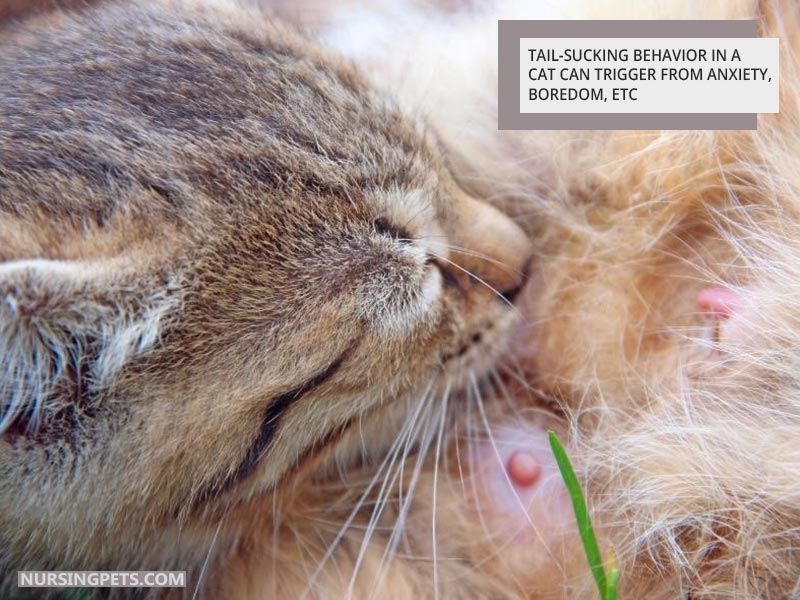
In some cases, a cat may suck on his tail because he’s bored or has nothing else to do.
What Are Some Possible Reasons Why A Cat Might Suck On Its Tail?
When your cat is sucking on its tail, it could be because of several reasons. Perhaps your cat is bored and is looking for something to do. Or, your cat could be feeling anxious or stressed and is using tail-sucking as a way to self-soothe.
Here are some possible reasons why your cat might be sucking on its tail:
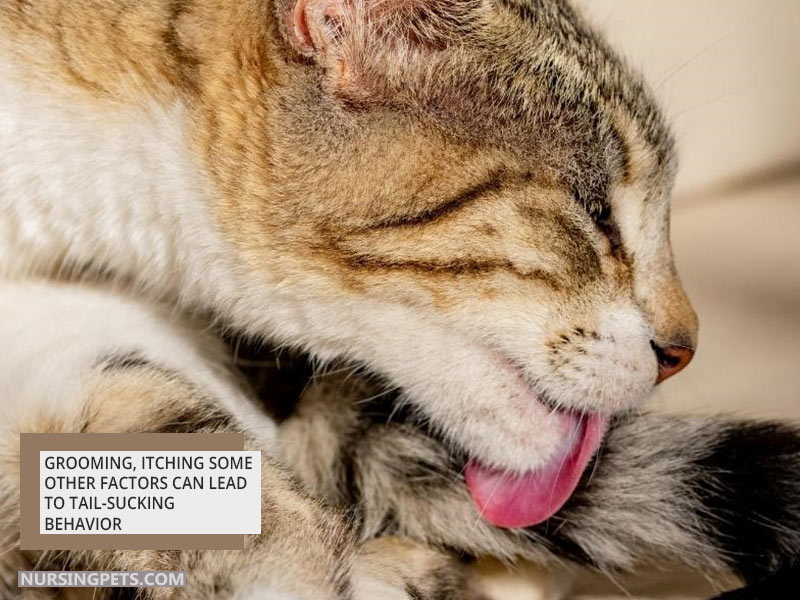
01. Itch or irritation: An itch or irritation at the base of the tail can be caused by several things, including allergies, parasites, and even anal gland problems. When your cat is licking excessively, it may be a sign that he’s trying to relieve an itch or irritation.
02. Grooming: Cats are fastidious groomers and will often lick their bodies to clean themselves. If your cat is licking the base of his tail, he may have missed a spot while grooming and is simply trying to clean himself.
03. Pica: Pica is a medical condition that can cause animals to compulsively eat non-food items. In some cases, cats with pica may suck on their tails as a way to self-soothe. If your vet suspects that your cat has pica, they may recommend a course of treatment.
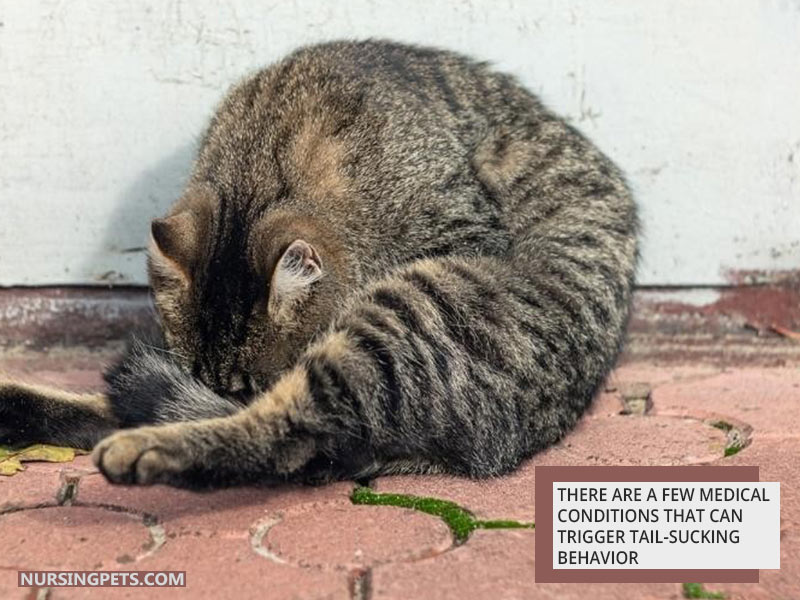
04. Sickness: Excessive licking can sometimes be a sign of illness in cats. Whenever Cat licks his tail more than usual, it’s best to take him to the vet to rule out any medical conditions.
Is It Harmful to A Cat to Suck On Its Tail?
Cats are known for their grooming habits, and one of these is licking their tails. While it may seem harmless, there can be potential risks associated with this behavior.
The main concern with a cat sucking on its tail is the possibility of them ingesting its hair. This can lead to digestive issues, such as hairballs or even an obstruction in the intestines. Additionally, if the cat is biting or chewing on the tail, this can lead to open sores or infections.
While most cats will groom themselves safely, it is important to keep an eye on your feline friend to make sure they are not causing any harm to themselves.
Is It Normal For A Cat To Suck Its Tail?
It is perfectly normal for a cat to suck on its tail. Many cats do it! It’s usually a sign of contentment and relaxation, but it can also be a way for a cat to self-soothe when they’re feeling anxious or stressed.
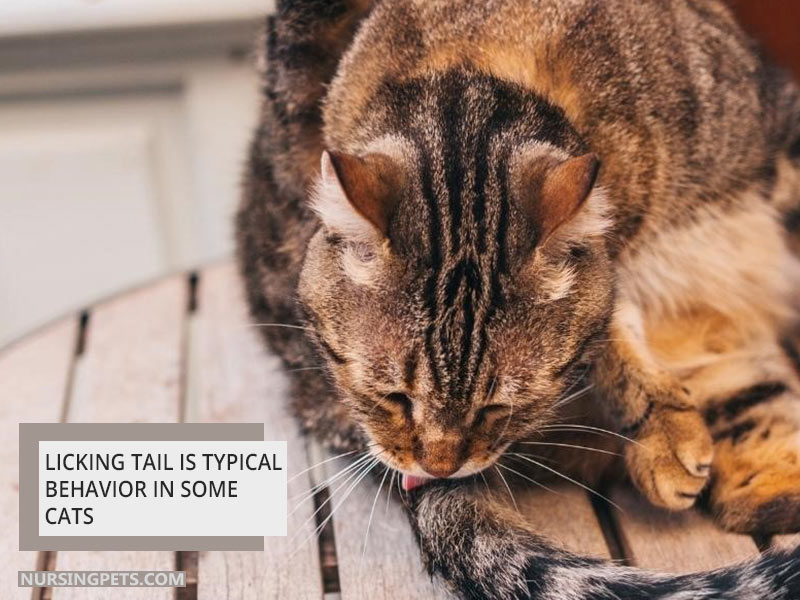
This behavior is often seen in kittens but can continue into adulthood.
Behavioral Reasons Your Cat May Suck Their Tail?
There are many reasons why a cat may suck their tail. Some of these reasons are behavioral and can be changed with training. Here are some of the most common behavioral reasons your cat may suck their tail:
Anxiety or stress: Whenever your cat is anxious or stressed, they may start sucking their tail as a way to comfort themselves. This is often seen in cats that have recently moved to a new home or have had a traumatic experience.
Boredom: If your cat is bored, it may start to suck on its tail to pass the time. To help keep your cat entertained and engaged, make sure to provide them with plenty of toys and playtime.
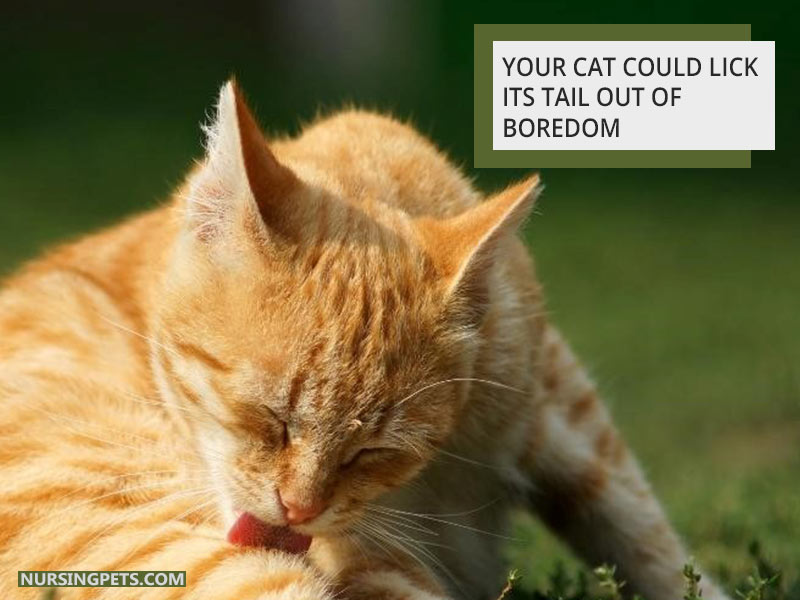
Hunger: In case your cat is hungry, it may start sucking its tail as a way to get your attention. This is often seen in kittens or cats that are on a diet.
Pain: When your cat is in pain, it may start sucking its tail as a way to self-soothe. This is often seen in cats with arthritis or other painful conditions.
How to Tell If Your Cat Is Sucking Their Tail Out Of Boredom Or Stress?
Have you ever wondered why your cat obsessively licks their tail? Well, you’re not alone. While cats groom themselves as a way to clean and maintain their fur, some cats develop a habit of licking their tail to the point of baldness.
This behavior is called tail-sucking, and it can be a sign that your cat is bored or stressed.
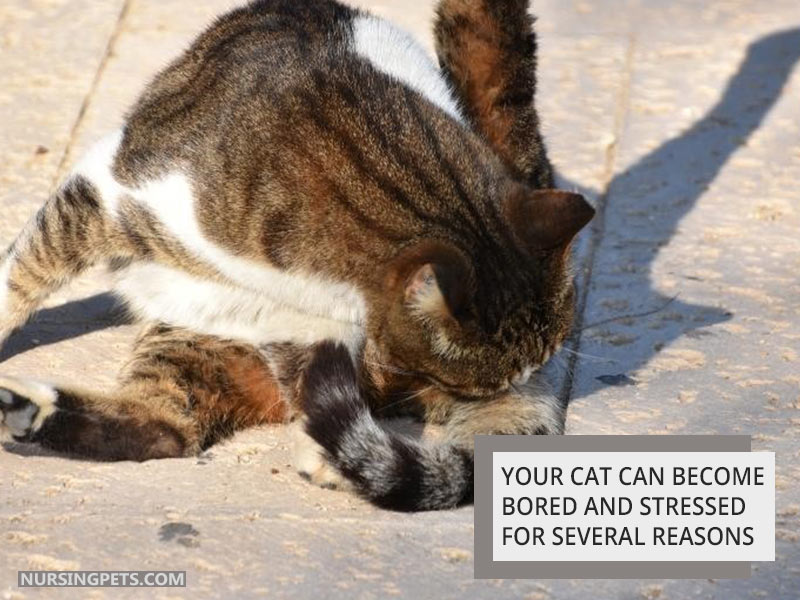
Here are some signs that your cat may be tail-sucking out of boredom:
- Cats lick their tail more when they’re left alone.
- Your cat started to suck on its tail after being spayed or neutered.
- Sometimes cats seem to suck on their tail more if they’re in a new or unfamiliar environment.
- They seem to suck on their tail more when they’re around people or animals they don’t know well.
- Your cat started to suck on their tail after a change in its routine, such as a change in its feeding schedule.
What Can You Do To Stop Your Cat From Sucking His Tail?
Most cats groom themselves regularly, and it’s not usually a cause for concern. However, a cat licking or sucking its tail excessively could be a sign of an underlying health condition. In some cases, tail-sucking can lead to self-mutilation.
Here are some steps you can take to stop your cat from sucking his tail:
Inspect your cat’s tail: If you can’t find any medical reason for tail-sucking, take a close look at his tail to see any injuries or irritations.
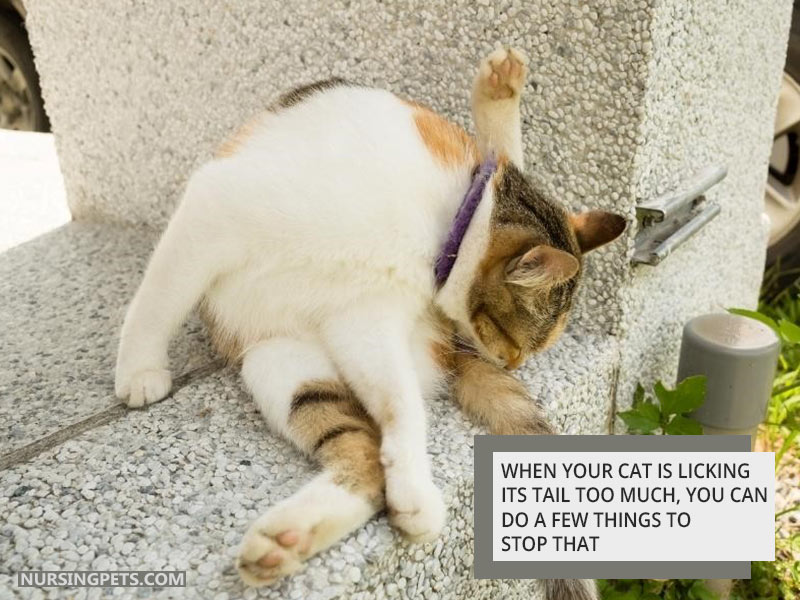
Provide distractions: Whenever your cat is bored or anxious, he may start sucking his tail as a way to self-soothe. Try providing him with some toys or scratching posts to keep him occupied.
Change your cat’s diet: Sometimes, tail-sucking can be a sign of nutritional deficiencies. Talk to your vet about changing your cat’s diet to one that is higher in protein and essential nutrients.
Consider using negative reinforcement: When your cat doesn’t respond to other methods, you may need to use negative reinforcement, such as a water sprayer, to deter him from tail-sucking.
Tail-sucking can be a difficult behavior to change, but it’s important to be patient and consistent with your approach.
Final Word
Whenever you notice your cat sucking on his tail, there’s no need to be concerned. However, when the behavior becomes excessive, it could be a sign of an underlying medical condition.
If your cat is compulsively sucking on his tail, make an appointment with your veterinarian. Excessive tail sucking may be a sign of anxiety, stress, or another medical condition.
Image Source:
- Shutterstock
- Canva.com/photos

